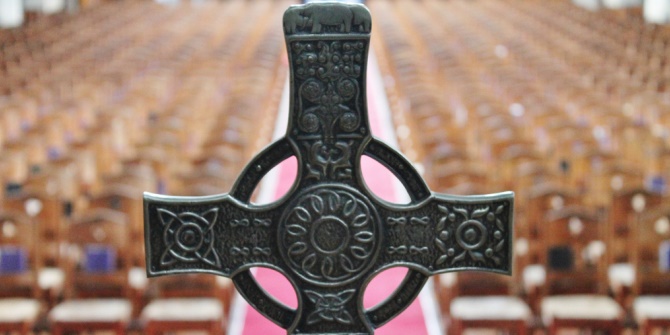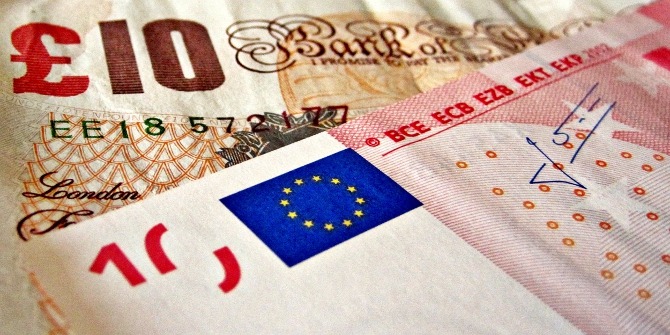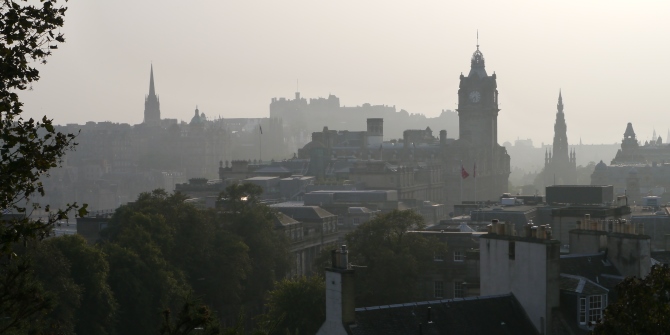 The much anticipated debate between Alex Salmond and Alistair Darling occurred yesterday. Craig McAngus summarises the debate, writing that, though civic engagement is alive and well in Scotland thanks to the referendum debate which has stimulated discussion amongst Scots at the grassroots level about key existential questions, the ‘big debate’ was a very poor example of democracy in action.
The much anticipated debate between Alex Salmond and Alistair Darling occurred yesterday. Craig McAngus summarises the debate, writing that, though civic engagement is alive and well in Scotland thanks to the referendum debate which has stimulated discussion amongst Scots at the grassroots level about key existential questions, the ‘big debate’ was a very poor example of democracy in action.
‘More heat than light’: a phrase that has been doing the rounds this morning on my own social networking circles, and it is hard to disagree. Last night’s debate between Alistair Darling and Alex Salmond has been discussed and hyped up for weeks; I’ve been in Germany for the past couple of weeks and even I could not escape the anticipation, although I blame Twitter and Facebook for that. As we head on to the last leg of this long affair that is the independence referendum, we know that the majority of voters have made up their minds. However, there is a significant number of undecided voters, significant in that there is enough of them to swing the result towards a ‘Yes’. It was hoped that the Darling-Salmond debate would connect with and inform these undecideds, particularly those who have very little, if any, interest in politics. Connect with them it may have done but the debate was unlikely to have informed, which certainly suits the campaign to keep Scotland in the UK.
The debate began with a cross-examination round where both participants got given the chance to question each other on topics of their choosing. Darling went first and stuck to the currency issue, leaving Salmond floundering to construct a convincing answer to Darling’s calls for a clear answer to the Scottish Government’s ‘plan B’ if a currency union is not forthcoming. This is difficult territory for Salmond because the UK Government has refused to pre-negotiate in the lead-up to the referendum and so it is not in his gift to say what the exact currency arrangements will be if there is a ‘Yes’ vote. However, he came across as if he was trying to avoid the question and the audience began to turn on him somewhat.
When it came to Salmond’s turn to cross-examine Darling, he took the unusual, and frankly odd, step of attacking the ‘No’ campaign itself rather than addressing substantive policy areas. Many viewers who do not follow this debate religiously must have been wondering who this Jean-Claude Junker character was and left bemused by Salmond’s jibe at Andy Burnham’s tongue-in-cheek comment that cars may have to drive on the right-hand-side of the road if Scotland becomes independent. His aim was to try and expose No Thanks/Better Together as a scaremongering organisation that talks Scotland down in order to frighten people into voting ‘No’. He failed to do this and seemed completely out of touch with the concerns of the voting public. In this sense, Salmond failed to take advantage of a massive opportunity to sell a positive vision of independence to otherwise disengaged viewers.
The debate then moved on to questions from the chair of the debate, STV journalist Bernard Ponsonby. His questions were tough but fair, and he examined both participants very thoroughly. Indeed, if anyone came out of the debate with flying colours, it was certainly Ponsonby. Then it was the turn of the studio audience to ask questions, and Salmond seemed more comfortable at this stage, gaining in confidence by the end and closing very strongly. Yet, much of the debate was technical and parochial and seemed to lack an inspiring edge. This suited Darling down to the ground, but for Salmond it has to be seen as a missed opportunity. The last thing he needed to do was get bogged down in Darling’s territory, but at times he took the bait all too willingly.
An opinion poll carried out by ICM immediately after the debate showed that 56 per cent thought Darling had come out on top compared to 44 per cent thinking Salmond had performed better. However, 74 per cent of those who do not know how they will vote on 18th September thought Salmond had performed better, with 26 per cent thinking Darling had done so. The number of those questioned in this poll who said they did not know how they would vote in the referendum was very small (31 after weighting is applied) so it is impossible to read too much into this finding. Nevertheless, despite many newspapers believing Darling came out on top on the night, the most important thing is how the debate was viewed by these undecideds, and that is a question that is yet to be thoroughly answered.
What this referendum debate has done is reinvigorate Scottish democracy and foster a renewed sense of civic engagement at a grassroots level. Voters are being asked key existential questions about the type of society, economy and government they want to have. Ironically, the politicians on display last night were the worst proponents of their respective causes. The ‘debate’ descended into mud-slinging at times and became a bad caricature of the very institution in which both Darling and Salmond earned much of their political stripes: Westminster.
Public opinion of our politicians has never been so low, but the referendum has created new spaces where ‘real’ politics can take place in their absence. Town halls, cafes, arts centres and our streets are now the hubs of Scotland’s constitutional debate where ordinary folk get together to discuss issues that matter to them and learn from one another. Civic engagement is alive and well in Scotland, and long may that continue. With every cry of ‘answer the question’ from the debate’s audience came the stark realisation that the game they play is not one that the public are interested in engaging with. In short, Scotland’s ‘big debate’ was a very poor example of democracy in action, especially when compared to what has been going on at the grassroots level for the past couple of years. The real debate is happening all around you in Scotland, you just have to take the time to look and engage.
Note: This article gives the views of the author, and not the position of the British Politics and Policy blog, nor of the London School of Economics. Please read our comments policy before posting. Featured image of Alistair Darling credit: Agencia Brazil (CC BY 3.0). Featured image of Alex Salmond credit: Scottish Government
 Craig McAngus is a Research Fellow at the University of Stirling. His research interests include political parties, public attitudes and constitutional change in the UK.
Craig McAngus is a Research Fellow at the University of Stirling. His research interests include political parties, public attitudes and constitutional change in the UK.








1 Comments